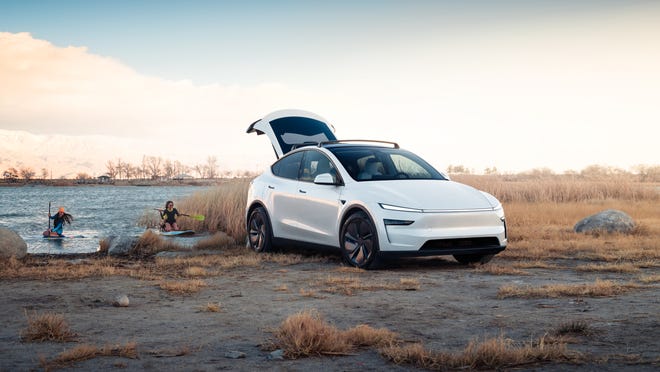President Donald Trump signed an executive order on Wednesday that could impose a 25% tariff on all imported cars and light-duty trucks entering the United States. This decision stands to significantly impact various automakers and auto suppliers. The executive order stipulates that tariffs will take effect on or after April 3 for automobiles and at a future date specified in the Federal Register for automobile parts, though no later than May 3, 2025.
The implications of these potential tariffs are far-reaching, with several major automakers and their supply chains likely to feel the pressure. Here’s a look at some of the companies that could be affected:
- BMW: BMW’s plant in San Luis Potosi, Mexico, manufactures the 3 Series, 2 Series Coupe, and M2 models. Nearly all of the plant’s output is designated for the U.S. and other global markets.
- Ford Motor Co.: Ford operates three plants in Mexico. In the first half of 2024 alone, the company exported just under 196,000 cars to North America, with a substantial 90% destined for the U.S., according to statistics from Mexico’s AMIA.
- General Motors: GM imported approximately 750,000 vehicles from Canada and Mexico into the U.S market in 2024. Most of those vehicles are made in Mexico, GlobalData reports. These imports include popular models such as the Chevy Silverado, GMC Sierra full-size pickups, and various midsize SUVs. GM’s Mexican plants also build two of the company’s new EVs. Furthermore, GM’s three plants in Canada manufacture electric vans, the Chevrolet Silverado Heavy Duty truck, and the V8 engine and dual-clutch transmission.
- Honda: Honda Motor sends a significant 80% of its Mexican production to the U.S. market. Anticipating potential repercussions, Honda issued a warning on November 6, indicating they might consider shifting production if permanent tariffs were implemented on Mexican imports.
- Kia: Kia Corp. from South Korea has a facility in Mexico responsible for producing its own vehicles and some Santa Fe SUVs for its affiliate Hyundai Motor, primarily for export to the United States.
- Mazda: In 2023, Mazda exported roughly 120,000 vehicles from Mexico to the United States and stated they would need to reassess future investments if additional tariffs are enforced.
- Nissan: Nissan Motor operates two plants in Mexico, focusing on models such as the Sentra, Versa, and Kicks, explicitly designed for the U.S. market. In the initial nine months of 2024, the company manufactured almost 505,000 vehicles in Mexico.
- Stellantis: Stellantis operates assembly facilities in Mexico, producing Ram pickups, vans, and the Jeep Compass midsize SUV. Additionally, the group owns two assembly plants in Canada: one for Chrysler models and another scheduled to restart production of a new Jeep model this year.
- Toyota: Toyota Motor manufactures its Tacoma pickup truck at two plants within Mexico. In 2023 alone, it sold more than 230,000 Tacoma trucks in the U.S., accounting for 10% of the total sales in that market.
- Volkswagen: Volkswagen’s factory in Puebla, Mexico, created approximately 350,000 vehicles in 2023, including models like the Jetta, Tiguan, and Taos, all for the U.S. market. In Canada, Volkswagen is constructing a battery gigafactory in Ontario, with production targeted to begin by 2027. Additionally, Volkswagen’s Audi plant in San Jose Chiapa, Mexico, produces the Q5, employing over 5,000 people. Figures from Mexico’s AMIA show that nearly 40,000 vehicles were exported to the U.S. in the initial half of 2024.
Auto Suppliers at Risk
Several auto suppliers also face potential disruption. These include:
- Autoliv: The world’s leading maker of air bags and seat belts, Autoliv, based in Sweden, employs around 15,000 staff in Mexico.
- Michelin: Tire maker Michelin operates two plants in Mexico and three in Canada.
- Yanfeng Automotive Interiors: This Chinese seat maker supplies automakers, including General Motors and Toyota, from its Mexican facilities.
Additional part manufacturers based in Mexico include Italian tire maker Pirelli, premium brakes maker Brembo from Italy, and Eurogroup Laminations, also from Italy.
Tesla previously encouraged its Chinese suppliers to establish plants in Mexico during 2023 to support the factory the company was planning to build beginning in early 2025. However, those plans have not materialized.




